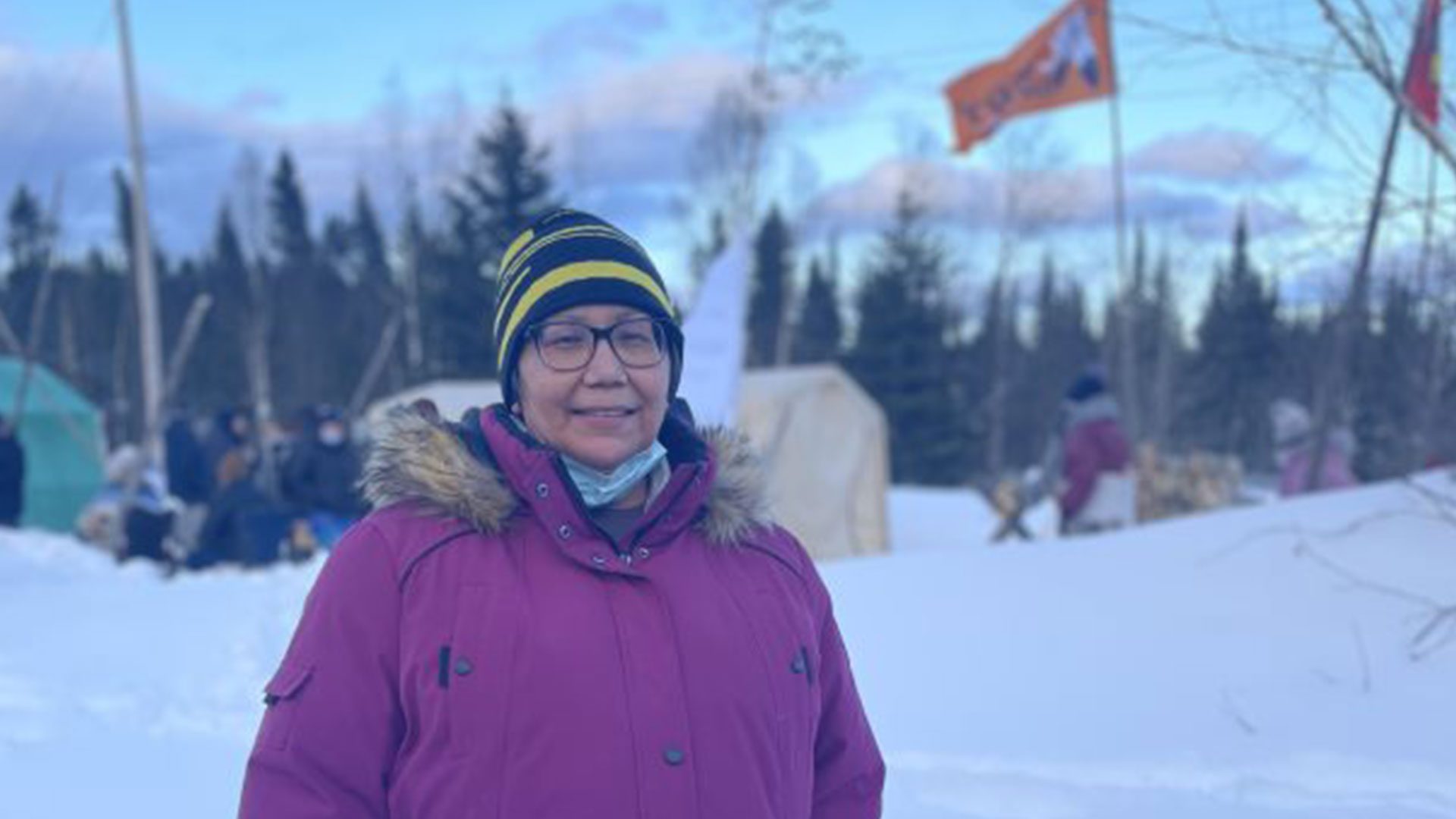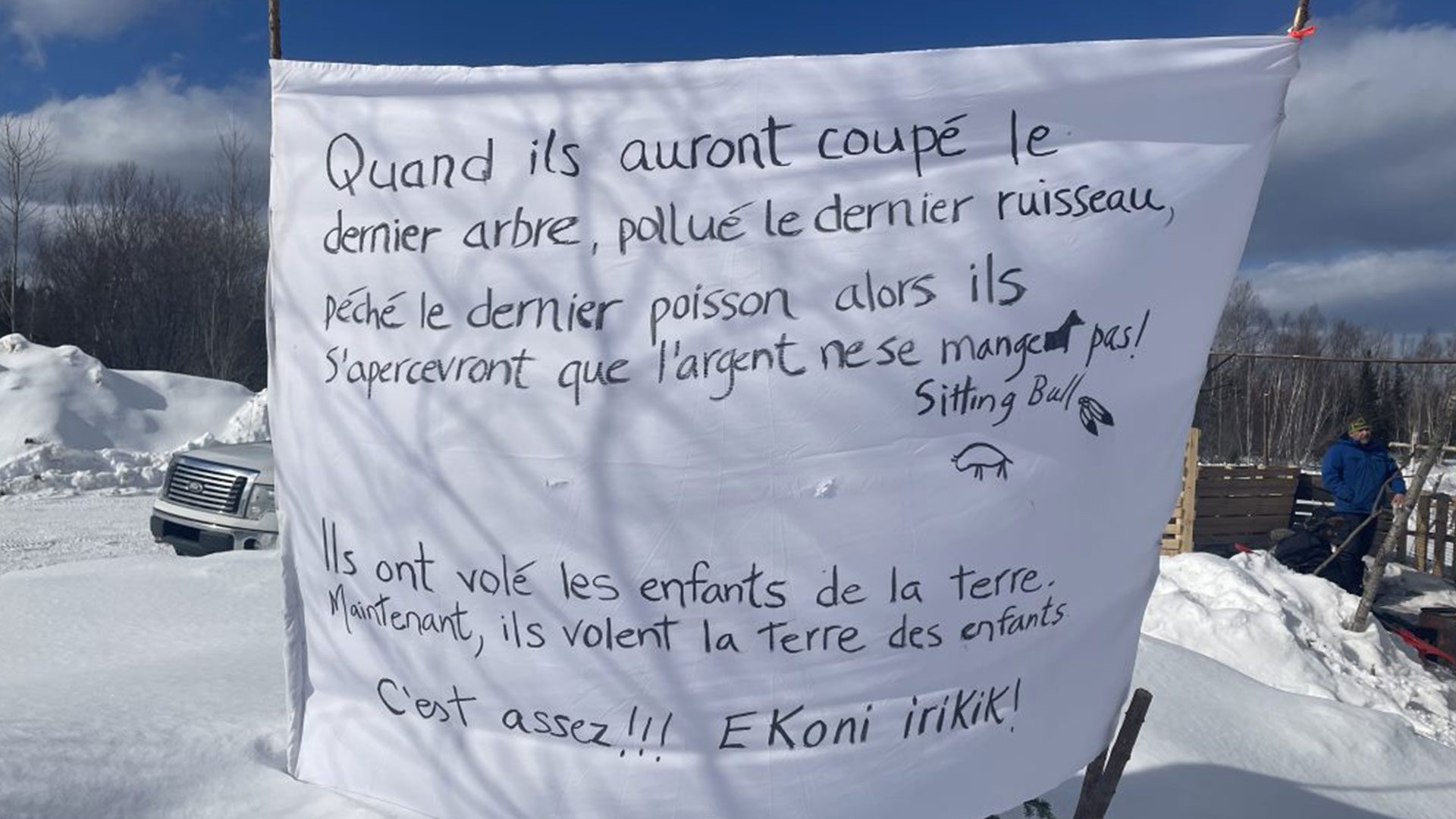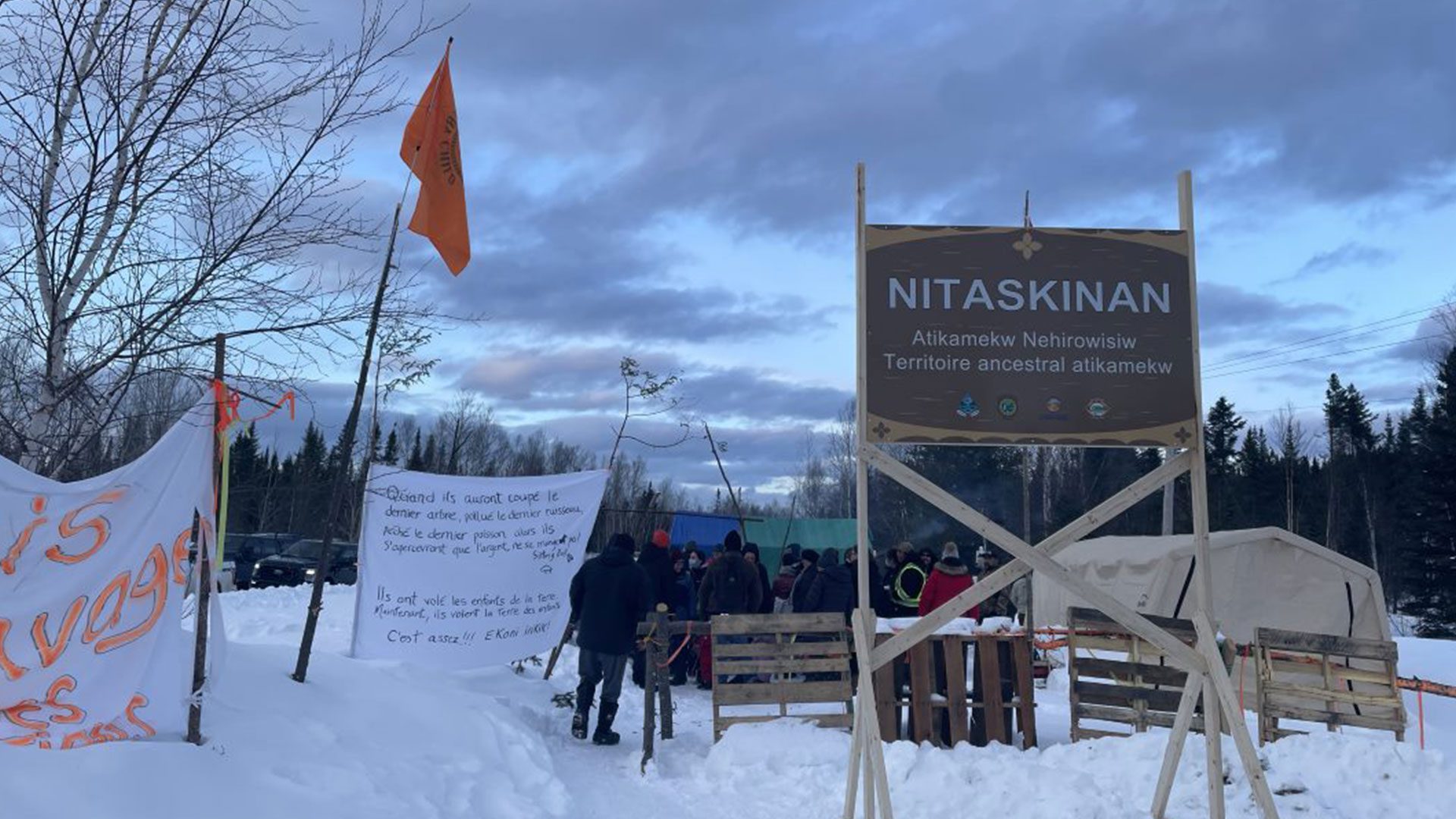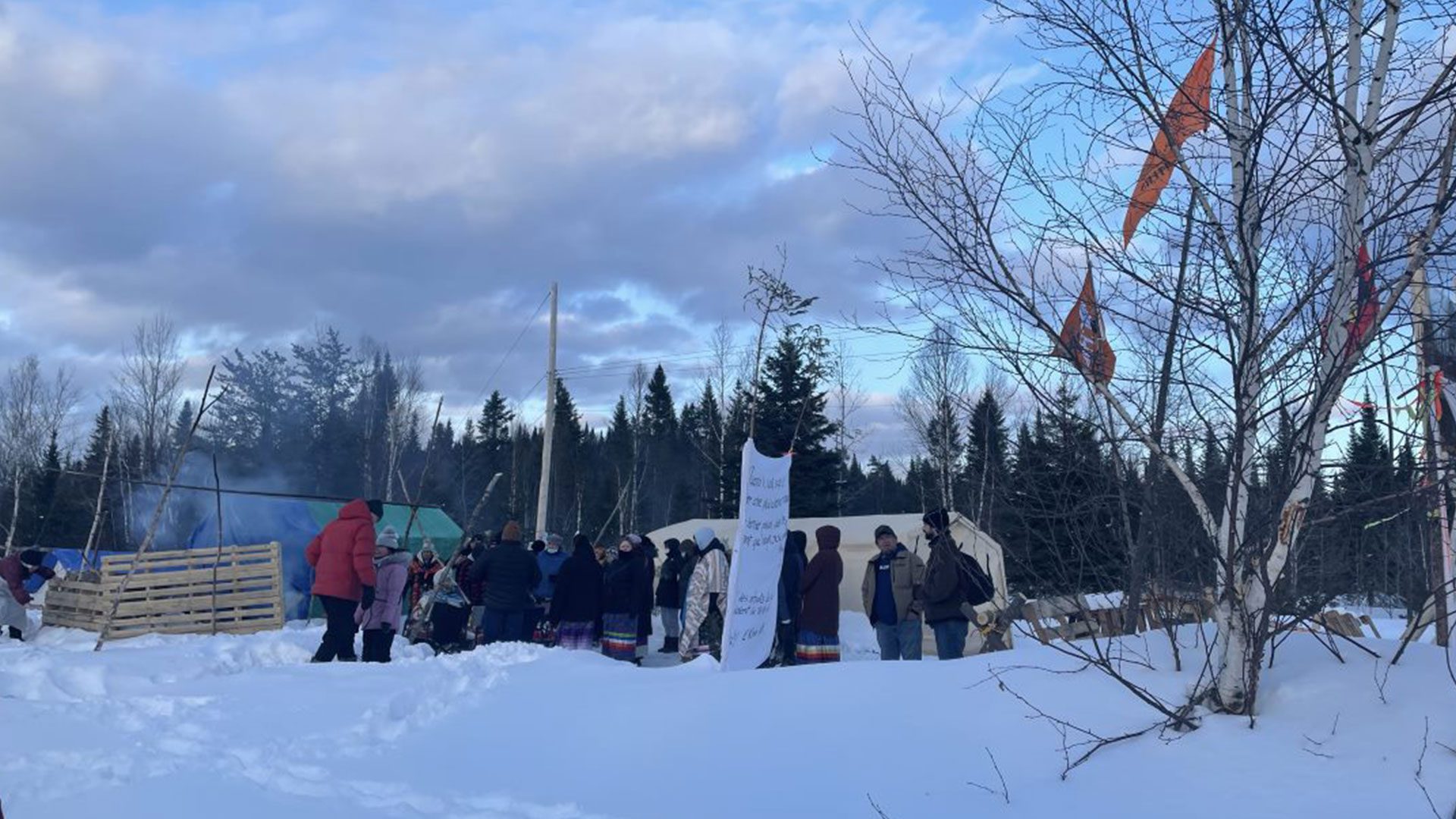The Atikamekw ancestral territory known as the Nitaskinan is still blanketed in snow — but Roger Echaquan, a cultural adviser or “medicine man” in his community of Manawan, knows the ground beneath it is resource-rich.
According to Echaquan, the woods surrounding Manawan, a community of around 1,600 people located 250 kms northwest of Montreal, contain remedies for ailments including heart disease, liver disease, Parkinson’s, and even infertility.
“That’s why when we look at, or when we’re in the forest, we’re never alone. Because all of our grandparents have changed into trees, to birds, that kind of thing,” Echaquan said.

But a source of particular pride for the Atikamekw of Manawan are the maple groves that have been divided and maintained for generations using a family clan system.
“When you drink maple water, it’s like drinking mother’s milk,” Echaquan explained.
Producing maple products, he says, is an inextricable part of traditional culture.
But the practice of “sugaring off” will look a little different this year for one family, whose grove was partially felled during a logging operation allegedly conducted out of bounds.
“When a tree is cut, you feel it in your body too,” Echaquan added. “Sometimes I feel pain, and I wonder why. And when I go into the forest, I see what’s been cut.”
‘Ekoni irikik’ means ‘enough’s enough’
The Dubé family of Manawan is one of a handful who have produced maple products for years.
The Atikamekw practice their own special technique to harvest maple syrup, said Annette Dubé-Vollant, spokesperson for the Dubé family.
“There’s not one family in Manawan that doesn’t know how to make Atikamekw maple syrup. And I know when we get people to taste it, they say ‘Hey, that doesn’t taste the same, it’s better!’” she said.
“I work in education and I think it’s very important that we transmit not only knowledge like math and reading, but also culture.”

This year, the normally festive time is shadowed by the threat of logging on vital sugar bush territory.
The grove was recently the site of a logging operation, despite a standing agreement signed in 2017 between the Dubé family and the government in hopes of protecting it from development, or possible contamination.
According to the family, the Scierie Saint Michel logging company started work in an agreed-upon area, but allegedly ventured into the Dubé family maple grove without their consent.
In reaction to the cuts, residents of Manawan have been camped out at the head of the road leading to the Dubé maple grove for about a month, erecting protest signs reading “Ekoni irikik” — Atikamekw for “enough’s enough.”
“Today, people are going to camp out on the territory because they need that contact with nature,” explained Therese Niquay, director of community services and projects in Manawan.

“The companies that come here to clear cut, it doesn’t bother them at all, because it’s not their living space. But it affects us, and it affects our children too, and it will affect generations,” said Niquay.
“Maybe it’s less profitable for the logging companies — but it’s also profitable for them to proceed with cuts that respect our way of life,” said Glenn Dubé, an elected councillor with the Atikamekw Council of Manawan, and relative of the Dubé family.
“It’s the bare minimum that this family has requested, and they still cut a path in that zone,” Dubé added.
According to Dubé, the cuts stopped in early March — but the camp remains in place because the Atikamekw don’t feel respected in the formulation of logging maps.
As of this posting, logging continues in other regions of traditional Atikamekw lands.
“For me, movements like what’s happening here to defend, at the heart of it, overexploiting forests, that makes a lot of sense. Because it’s our life, it’s really at the heart of our culture,” said Niquay.
Forestry Ministry served with legal notice over logging in Wemotaci
If this situation sounds familiar, look 200 kms to the east to the Atikamekw Council of Wemotaci.
In mid-February, Wemotaci officials — flanked by territorial chiefs and legal counsel — served the Quebec Ministry of Forests, Fauna and Parks with a formal notice to stop logging on their territory, alleging they were not consulted or meaningfully included in decision-making.
Like those gathering in Manawan, Wemotaci Chief Francois Neatshit expressed concern over destruction of Atikamekw ancestral territory, as well as impacts on traditional way of life.
“It’s the wildlife habitat that’s disrupted. Animals are leaving — wild game is leaving. We rarely hear birds anymore, even though we’ve heard them for years,” he explained.

“Our objective is not just to talk about our traditional activities, but to be able to carry them out in harmony with the [non-Indigenous] Quebecers who frequent our territories.”
At the time, Wemotaci’s lawyer told APTN News that even when the communities are “consulted” or made aware of development plans they are often not accorded enough time to react.
“For example, if a chief of a territory asks for a particular part of their land to be protected – they can’t, because if the usage if this portion of land has already been decided to be for forestry, then this can’t be changed when they are consulted. It’s already too late to change that,” Jacynthe Ledoux said.
‘We want to have our say’
Like their neighbours in Wemotaci, community members in Manawan insist they’re not against forestry development on the whole.
However, they feel they deserve to be equal partners in all plans that could affect their sprawling ancestral territory.
“We want to re-appropriate our lands. We want to re-appropriate our culture. And it doesn’t mean that we’re against development. But we want to have our say in that development. We’re talking about participating in decisions,” said Niquay.
The Atikamekw Council of Manawan submitted a moratorium on forestry cuts in November 2021 until they’re meaningful participants in the forestry industry.
“Indigenous people need a place in all consultations, and they have to be included in decisions,” said Dubé-Vollant.
Dubé-Vollant says an investigation is underway to assess who authorized the cuts on the Dubé family grove — and why they were allowed to proceed despite the agreement in place.

For the moment, things at the solidarity camp are peaceful, and there have been no conflicts with the police presence on-site.
“Nation to nation, you’re supposed to have your own framework, your own ways of doing, and you work together to build something. But for now, nation to nation, we’re still very far from that,” said Niquay.
Manawan Council members are slated to meet with Forestry Ministry officials in the coming weeks, according to Glenn Dubé.
APTN contacted the Ministry of Forests, Fauna, and Parks for comment on the incident and information about the First Nations consultation measures currently in place.
A Ministry spokesperson confirmed receipt of that email, but did not respond before publishing time.
While the government continues its push for industry, Manawan says they’ll continue to push for their traditions.
“We’re not saying to stop the cuts, we’re just saying ‘take care.’ Take what you need,” Echaquan added.









